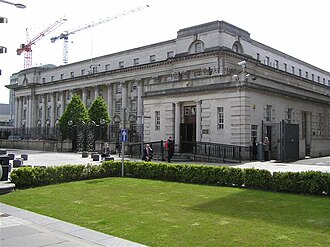
Court records are invaluable resources that provide insights into legal proceedings, decisions, and historical context. Whether you are researching family history, legal precedents, or historical events, these records can offer detailed accounts and essential data. Up until 1922, the court system for the six counties of what is now Northern Ireland were the same as the rest of Ireland. These courts consisted of Quarter Sessions, Petty Sessions and County Courts.
After the partition of Ireland and the creation of Northern Ireland, the courts systems diverged. Northern Ireland continues to have a separate legal system to the rest of the United Kingdom. There are exceptions to that rule, such as in immigration and military law, for which there is a unified judicial system for the whole United Kingdom. Administration of the courts is the responsibility of the Northern Ireland Courts and Tribunals Service.[1]
Research your ancestors on MyHeritage
Current Courts System in Northern IrelandCurrent Courts System in Northern Ireland
There are higher and lower courts to deal with different types of cases and legal action in Northern Ireland[2]:
| UK Supreme Court | hears appeals on points of law in cases of major public importance |
| Court of Appeal | hears appeals on points of law in criminal and civil cases from all courts |
| High Court | hears complex or important civil cases and appeals from county court |
| County Courts | hears a wide range of civil actions including small claims and family cases |
| The Crown Court | hears all serious criminal cases |
| Magistrates' Courts (including Youth Courts and Family Proceedings) | hears less serious criminal cases, cases involving juveniles and civil and family cases |
| Enforcement of Judgments Office | enforces civil judgements |
Finding Court Records in Northern IrelandFinding Court Records in Northern Ireland
Surviving Irish Petty Sessions Registers for the 26 counties of the Republic of Ireland date mostly from 1858 to 1924, with just a few dating earlier. Nearly all the originals are held by the National Archives of Ireland (NAI) in Dublin.[3] The NAI's Irish Petty Sessions collection was microfilmed by FamilySearch and is also available through the various online subscription websites.
The Petty Court sessions records for the six counties of Northern Ireland are held by the Public Record Office Northern Ireland. They have not been digitised and can only be viewed in person at PRONI's Belfast offices.[4] Reports on court cases in Northern Ireland are featured in local and national newspapers. This can be a useful source for information on various judgements that involved your ancestors where access to the original proceedings is restricted. Most historic newspapers for Northern Ireland can be accessed through the British Newspaper Archive and some are also available online through the Irish Newspaper Archive.
Conflict Related Court CasesConflict Related Court Cases
The legacy of the Troubles in Northern Ireland (1968-1998) has also created a large volume of legal records. This can be important for those researching relatives who were caught up in the events of the period. PRONI holds the records of many court cases and inquests related to the conflict. It is possible to write to PRONI seeking access to these court files.
PRONI will be able to conduct an initial search to confirm information relevant to your request is held. If PRONI does not hold the information or record you requested, PRONI will confirm this. If the record is already designated as open, you will be able to view it onsite or request a copy. PRONI may be able to direct you to other records held in The National Archives, London or National Archives of Ireland, Dublin. Keep in mind that PRONI does not have all court records about the conflict, as some of these court cases took place in other jurisdictions. To find out if PRONI has the record of a particular court case, email or write to PRONI and include the name or names of the accused. It is helpful if you also include the dates of the case and the court in which it was heard.
PRONI considers requests for access to information under the Data Protection Act 2018 (DPA), the Freedom of Information Act 2000 (FOIA) and the Court Files Privileged Access Rules (NI) 2016. Applicants can decide which process is most suited to their needs. Relatives can contact PRONI to find out if it has a particular court record. The process under the 2016 Rules allows individuals privileged access to information in court files provided they sign an undertaking that they will keep the released files confidential. Applicants can either request access to information themselves, or they can appoint a legal representative or charity to receive the information on their behalf.[5]
See alsoSee also
Explore more about Northern Ireland Court RecordsExplore more about Northern Ireland Court Records
- United Kingdom - Court Records record collection at MyHeritage
- Family Secrets: The Court Records Tell It All webinar at Legacy Family Tree webinars
- Public Record Office of Northern Ireland (PRONI)
References
- ↑ https://www.nidirect.gov.uk/contacts/northern-ireland-courts-and-tribunals-service
- ↑ https://www.nidirect.gov.uk/articles/introduction-justice-system
- ↑ https://nationalarchives.ie/collections/court-records/
- ↑ https://www.irish-genealogy-toolkit.com/irish-petty-sessions.html
- ↑ https://www.nidirect.gov.uk/articles/conflict-related-court-records

